人教版英语英语现在完成时的用法大全含解析
- 格式:doc
- 大小:118.50 KB
- 文档页数:16
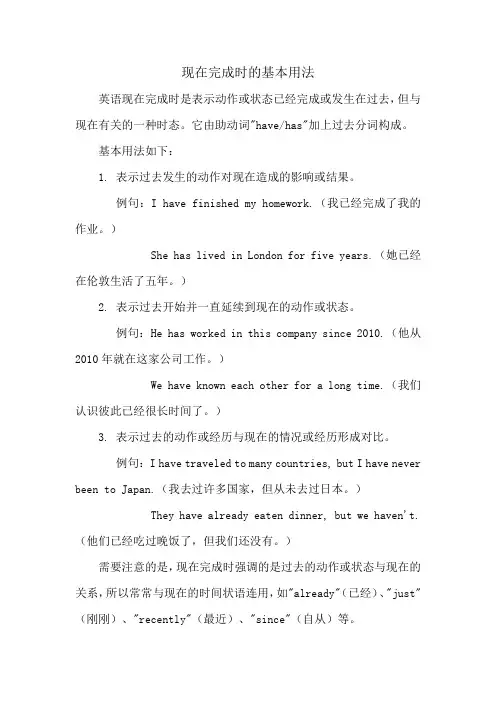
现在完成时的基本用法
英语现在完成时是表示动作或状态已经完成或发生在过去,但与现在有关的一种时态。
它由助动词"have/has"加上过去分词构成。
基本用法如下:
1. 表示过去发生的动作对现在造成的影响或结果。
例句:I have finished my homework.(我已经完成了我的作业。
)
She has lived in London for five years.(她已经在伦敦生活了五年。
)
2. 表示过去开始并一直延续到现在的动作或状态。
例句:He has worked in this company since 2010.(他从2010年就在这家公司工作。
)
We have known each other for a long time.(我们认识彼此已经很长时间了。
)
3. 表示过去的动作或经历与现在的情况或经历形成对比。
例句:I have traveled to many countries, but I have never been to Japan.(我去过许多国家,但从未去过日本。
) They have already eaten dinner, but we haven't.(他们已经吃过晚饭了,但我们还没有。
)
需要注意的是,现在完成时强调的是过去的动作或状态与现在的关系,所以常常与现在的时间状语连用,如"already"(已经)、"just"(刚刚)、"recently"(最近)、"since"(自从)等。
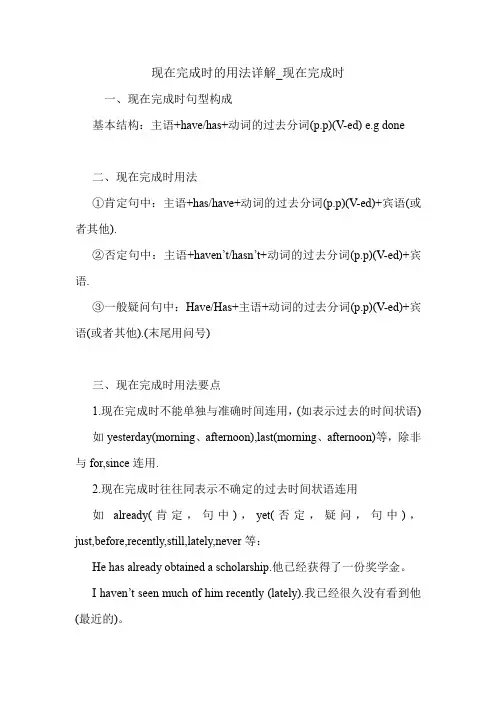
现在完成时的用法详解_现在完成时一、现在完成时句型构成基本结构:主语+have/has+动词的过去分词(p.p)(V-ed) e.g done二、现在完成时用法①肯定句中:主语+has/have+动词的过去分词(p.p)(V-ed)+宾语(或者其他).②否定句中:主语+haven’t/hasn’t+动词的过去分词(p.p)(V-ed)+宾语.③一般疑问句中:Have/Has+主语+动词的过去分词(p.p)(V-ed)+宾语(或者其他).(末尾用问号)三、现在完成时用法要点1.现在完成时不能单独与准确时间连用,(如表示过去的时间状语)如yesterday(morning、afternoon),last(morning、afternoon)等,除非与for,since连用.2.现在完成时往往同表示不确定的过去时间状语连用如already(肯定,句中),yet(否定,疑问,句中),just,before,recently,still,lately,never等:He has already obtained a scholarship.他已经获得了一份奖学金。
I haven’t seen much of him recently (lately).我已经很久没有看到他(最近的)。
We have seen that film before.我们以前已经看过那部电影了。
Have they found the missing child yet?他们找到失踪的孩子了吗?3. 现在完成时态经常与表示频度的时间状语连用,如often,sometimes,ever,never,twice,on several occasion等:Have you ever been to Beijing?你以前去过北京吗?I have never heard Bunny say anything against her.我从来没有听到Bunny说她的坏话。
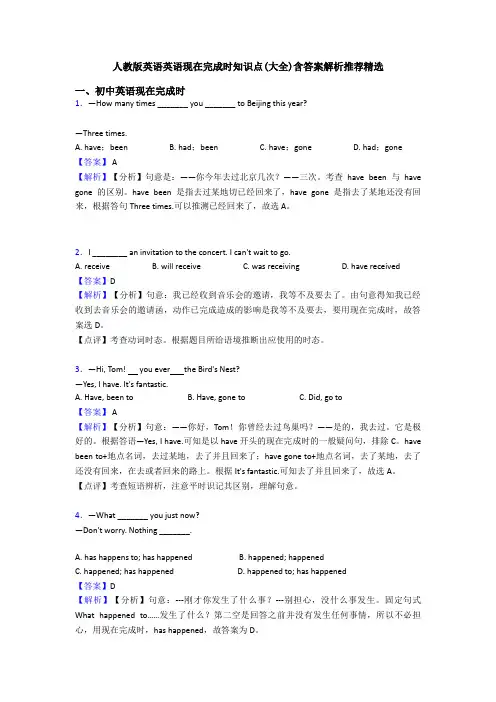
人教版英语英语现在完成时知识点(大全)含答案解析推荐精选一、初中英语现在完成时1.—How many times _______ you _______ to Beijing this year?—Three times.A. have;beenB. had;beenC. have;goneD. had;gone【答案】 A【解析】【分析】句意是:——你今年去过北京几次?——三次。
考查have been 与have gone 的区别。
have been 是指去过某地切已经回来了,have gone 是指去了某地还没有回来,根据答句Three times.可以推测已经回来了,故选 A。
2.I ________ an invitation to the concert. I can't wait to go.A. receiveB. will receiveC. was receivingD. have received【答案】D【解析】【分析】句意:我已经收到音乐会的邀请,我等不及要去了。
由句意得知我已经收到去音乐会的邀请函,动作已完成造成的影响是我等不及要去,要用现在完成时,故答案选D。
【点评】考查动词时态。
根据题目所给语境推断出应使用的时态。
3.—Hi, Tom! you ever the Bird's Nest?—Yes, I have. It's fantastic.A. Have, been toB. Have, gone toC. Did, go to【答案】 A【解析】【分析】句意:——你好,Tom!你曾经去过鸟巢吗?——是的,我去过。
它是极好的。
根据答语—Yes, I have.可知是以have开头的现在完成时的一般疑问句,排除C。
have been to+地点名词,去过某地,去了并且回来了;have gone to+地点名词,去了某地,去了还没有回来,在去或者回来的路上。
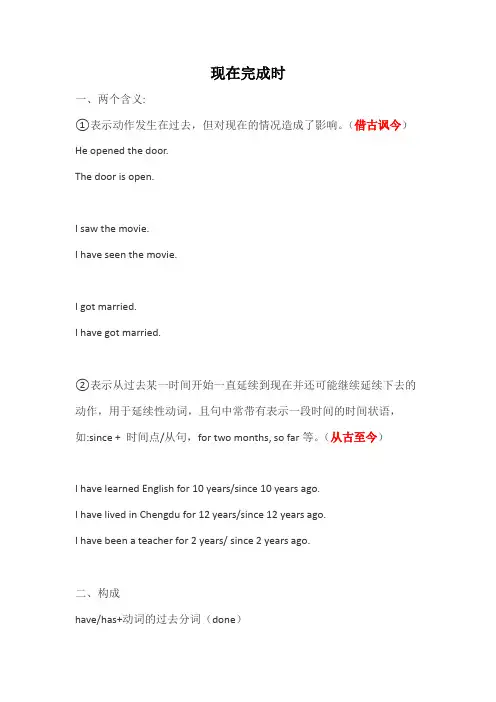
现在完成时一、两个含义:①表示动作发生在过去,但对现在的情况造成了影响。
(借古讽今)He opened the door.The door is open.I saw the movie.I have seen the movie.I got married.I have got married.②表示从过去某一时间开始一直延续到现在并还可能继续延续下去的动作,用于延续性动词,且句中常带有表示一段时间的时间状语,如:since + 时间点/从句,for two months, so far等。
(从古至今)I have learned English for 10 years/since 10 years ago.I have lived in Chengdu for 12 years/since 12 years ago.I have been a teacher for 2 years/ since 2 years ago.二、构成have/has+动词的过去分词(done)三、标志词for, since, already, yet, before, recently, over the …., in the past few…..四、already与yet的区别already用于肯定句(已经)yet用于否定句(还)和疑问句(已经)ever & neverever作副词,意为“曾经”,常用于现在完成时的一般疑问句和肯定句中,置于主语之后,过去分词之前。
never作副词,意为“从不;从未”,用于现在完成时中,表示否定,位于助动词have/has之后,过去分词之前。
五.have been to & have gone to & have been inhave been to 去了某地,已回have gone to 去了某地,未回have been in 在哪里待了多久后面是地点副词there、here、home 时,省略to六、延续性和非延续性1. 含义:延续性动词表示能够延续的动作,这种动作可以延续下去或产生持久影响。
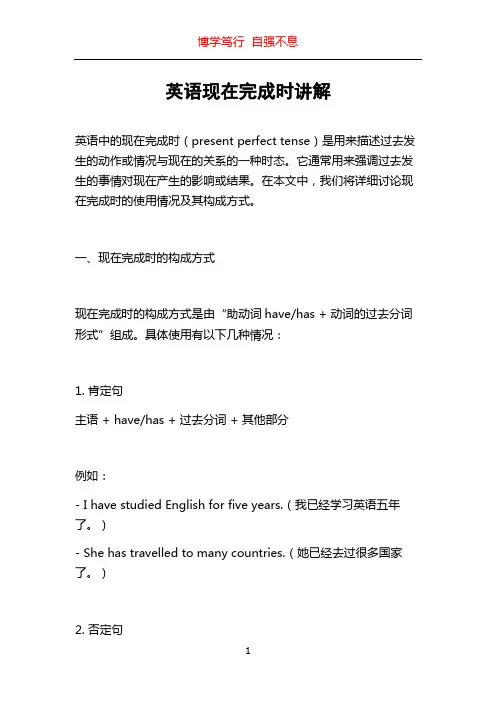
英语现在完成时讲解英语中的现在完成时(present perfect tense)是用来描述过去发生的动作或情况与现在的关系的一种时态。
它通常用来强调过去发生的事情对现在产生的影响或结果。
在本文中,我们将详细讨论现在完成时的使用情况及其构成方式。
一、现在完成时的构成方式现在完成时的构成方式是由“助动词have/has + 动词的过去分词形式”组成。
具体使用有以下几种情况:1. 肯定句主语 + have/has + 过去分词 + 其他部分例如:- I have studied English for five years.(我已经学习英语五年了。
)- She has travelled to many countries.(她已经去过很多国家了。
)2. 否定句主语 + have/has + not + 过去分词 + 其他部分例如:- He hasn't finished his work yet.(他还没有完成工作。
)- We haven't seen each other for a long time.(我们已经很久没有见面了。
)3. 疑问句Have/Has + 主语 + 过去分词 + 其他部分?例如:- Have you ever visited Paris?(你曾经去过巴黎吗?)- Has she seen the latest movie?(她看过最新的电影吗?)二、现在完成时的使用情况现在完成时通常用于以下几种情况:1. 表示过去开始的动作一直延续至今或刚刚结束的情况。
例如:- I have lived in this city for ten years.(我在这个城市已经住了十年了。
)- They have worked on this project since last month.(他们从上个月开始就一直在做这个项目。
)2. 表示过去发生的动作对现在产生的影响或结果。

现在完成时的四种用法现在完成时是英语中一个很重要的时态,也是很容易弄错的一个时态。
归纳起来,现在完成时共有四种主要用法,现分别解说如下:一、现在完成时表示影响该用法的现在完成时表示一个过去发生的动作在过去已经完成,并且这个过去发生并完成的动作对现在有影响或结果,同时说话者强调的或感兴趣的就是这个影响或结果,如汉语说“他已离开这个城市了”,其中的“离开”肯定发生了,它对现在的影响或结果就是“他现在已不在这个城市了”;又如汉语说“有人把窗户打破了”,显然“打破窗户”这一动作发生在过去,并且在过去已经完成了,但说话人强调的重点是打破窗户对现在的影响——窗户现在仍是破的。
如:He has left the city. 他已离开这个城市。
(结果:他不在这个城市。
)Someone has broken the window. 有人把窗户打破了。
(结果:窗户仍破着。
)I have lost my pen. 我把钢笔丢了。
(结果:我现在无钢笔用。
)He has finished his work. 他把工作做完了。
(结果:他现在可以做其他的事了。
)二、现在完成时表示持续该用法的现在完成时表示一个过去发生的动作或开始的状语在过去并未完成或结束,而是一直持续到现在,并且有可能继续下去(也可能到此结束),如汉语说“他在我们学校教书已有30年了”,显然“他在我们学校教书”是从30年前开始,并且一直教到现在,已经持续了30年;又如汉语说“自上个星期以来他一直很忙”,显然“忙”是从上个星期开始的,并且这一“忙”就一直忙到现在。
如:He has taught in our school for 30 years. 他在我们学校教书已有30年了。
He has been busy since last week. 自上个星期以来他一直很忙。
英语微信群是目前学习英语最有效的方法,群里都是说英语,没有半个中文,而且规则非常严格,是一个超级不错的英语学习环境,群里有好多英语超好的超牛逼的人,还有鬼佬和外国美眉。
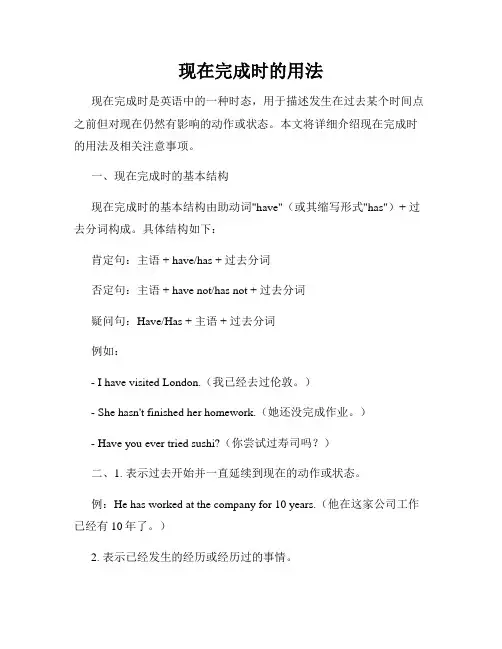
现在完成时的用法现在完成时是英语中的一种时态,用于描述发生在过去某个时间点之前但对现在仍然有影响的动作或状态。
本文将详细介绍现在完成时的用法及相关注意事项。
一、现在完成时的基本结构现在完成时的基本结构由助动词"have"(或其缩写形式"has")+ 过去分词构成。
具体结构如下:肯定句:主语 + have/has + 过去分词否定句:主语 + have not/has not + 过去分词疑问句:Have/Has + 主语 + 过去分词例如:- I have visited London.(我已经去过伦敦。
)- She hasn't finished her homework.(她还没完成作业。
)- Have you ever tried sushi?(你尝试过寿司吗?)二、1. 表示过去开始并一直延续到现在的动作或状态。
例:He has worked at the company for 10 years.(他在这家公司工作已经有10年了。
)2. 表示已经发生的经历或经历过的事情。
例:I have been to Paris twice.(我去过巴黎两次。
)3. 描述过去发生但对现在有影响的动作或状态。
例:They have just finished their project.(他们刚刚完成了他们的项目。
)4. 表示刚刚完成的动作或刚刚发生的事情。
例:We have just moved into a new house.(我们刚刚搬进了新家。
)5. 表示在过去某个时间点之前已经完成的动作或事情。
例:She has already bought the tickets.(她已经买好了票。
)6. 用于带有时间状语的句子,表示在过去某一段时间内已经完成的动作或事情。
例:He has read three books this month.(这个月他已经读了三本书。
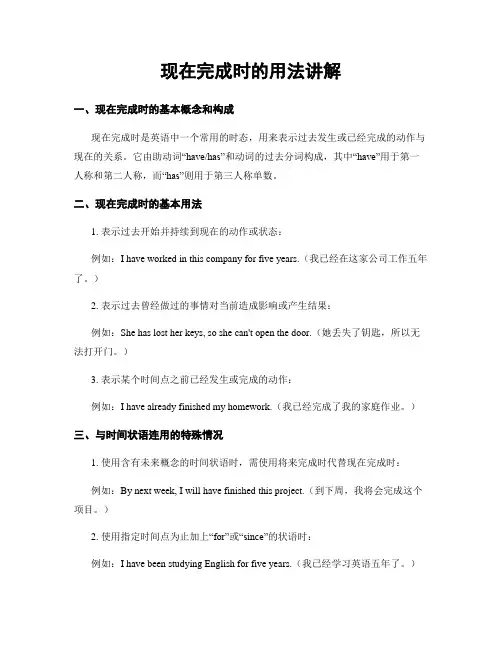
现在完成时的用法讲解一、现在完成时的基本概念和构成现在完成时是英语中一个常用的时态,用来表示过去发生或已经完成的动作与现在的关系。
它由助动词“have/has”和动词的过去分词构成,其中“have”用于第一人称和第二人称,而“has”则用于第三人称单数。
二、现在完成时的基本用法1. 表示过去开始并持续到现在的动作或状态:例如:I have worked in this company for five years.(我已经在这家公司工作五年了。
)2. 表示过去曾经做过的事情对当前造成影响或产生结果:例如:She has lost her keys, so she can't open the door.(她丢失了钥匙,所以无法打开门。
)3. 表示某个时间点之前已经发生或完成的动作:例如:I have already finished my homework.(我已经完成了我的家庭作业。
)三、与时间状语连用的特殊情况1. 使用含有未来概念的时间状语时,需使用将来完成时代替现在完成时:例如:By next week, I will have finished this project.(到下周,我将会完成这个项目。
)2. 使用指定时间点为止加上“for”或“since”的状语时:例如:I have been studying English for five years.(我已经学习英语五年了。
)例如:He has lived in London since 2010.(他自2010年以来一直住在伦敦。
)四、与其他时态的对比1. 与一般过去时对比:现在完成时强调动作带来的结果或影响,而一般过去时则着重指明具体发生的时间点。
2. 与过去完成时对比:现在完成时强调过去到现在产生的影响或结果,而过去完成时则强调过去某个时间点之前已经完成的动作。
3. 与将来完成时对比:将来完成时用于表示将来某个时间点之前已经发生或已经完成的事情,而现在完成时则用于表示从过去某个时间点开始到现在所持续的动作或状态。
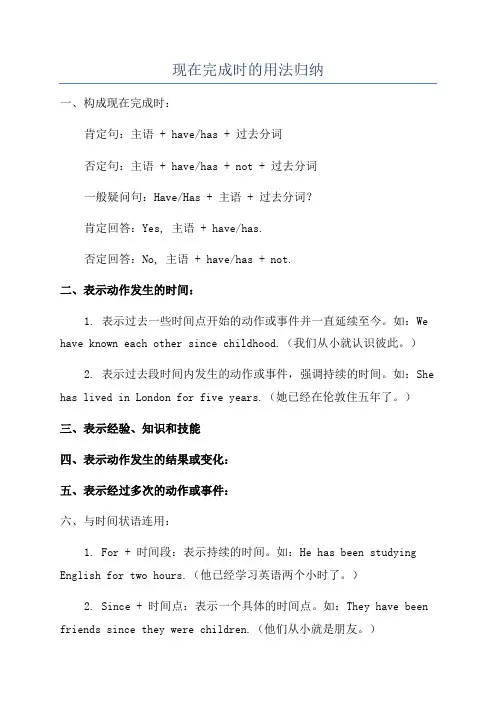
现在完成时的用法归纳一、构成现在完成时:肯定句:主语 + have/has + 过去分词否定句:主语 + have/has + not + 过去分词一般疑问句:Have/Has + 主语 + 过去分词?肯定回答:Yes, 主语 + have/has.否定回答:No, 主语 + have/has + not.二、表示动作发生的时间:1. 表示过去一些时间点开始的动作或事件并一直延续至今。
如:We have known each other since childhood.(我们从小就认识彼此。
)2. 表示过去段时间内发生的动作或事件,强调持续的时间。
如:She has lived in London for five years.(她已经在伦敦住五年了。
)三、表示经验、知识和技能四、表示动作发生的结果或变化:五、表示经过多次的动作或事件:六、与时间状语连用:1. For + 时间段:表示持续的时间。
如:He has been studying English for two hours.(他已经学习英语两个小时了。
)2. Since + 时间点:表示一个具体的时间点。
如:They have been friends since they were children.(他们从小就是朋友。
)3. Just,already,yet等词:表示已经发生过或尚未发生的动作或事件。
如:She has just finished her homework.(她刚做完她的作业。
)4. Ever,never等词:表示曾经或从未发生过的动作或事件。
如:Have you ever been to Japan?(你曾经去过日本吗?)总之,现在完成时用于表示与现在有关的过去动作或事件,我们在使用时要注意动作的发起时间、持续时间以及对现在的影响等方面,并且要合理运用时间状语以增强句子的准确性和表达能力。
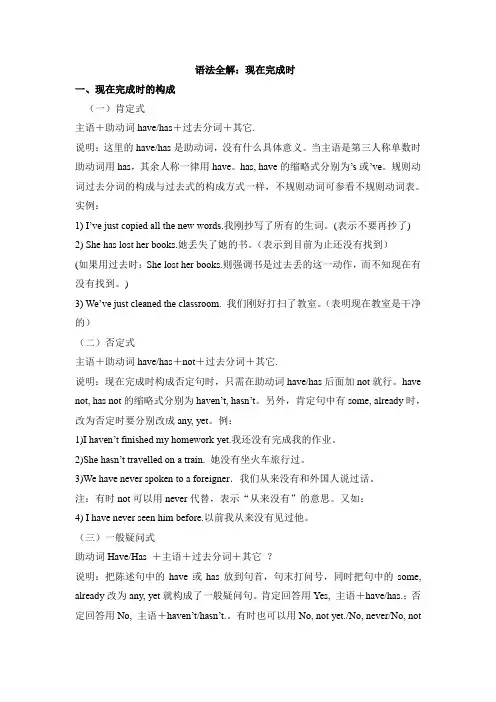
语法全解:现在完成时一、现在完成时的构成(一)肯定式主语+助动词have/has+过去分词+其它.说明:这里的have/has是助动词,没有什么具体意义。
当主语是第三人称单数时助动词用has,其余人称一律用have。
has, have的缩略式分别为’s或’ve。
规则动词过去分词的构成与过去式的构成方式一样,不规则动词可参看不规则动词表。
实例:1) I’ve just copied all the new words.我刚抄写了所有的生词。
(表示不要再抄了)2) She has lost her books.她丢失了她的书。
(表示到目前为止还没有找到)(如果用过去时:She lost her books.则强调书是过去丢的这一动作,而不知现在有没有找到。
)3) We’ve just cleaned the classroom. 我们刚好打扫了教室。
(表明现在教室是干净的)(二)否定式主语+助动词have/has+not+过去分词+其它.说明:现在完成时构成否定句时,只需在助动词have/has后面加not就行。
have not, has not的缩略式分别为haven’t, hasn’t。
另外,肯定句中有some, already时,改为否定时要分别改成any, yet。
例:1)I haven’t finished my homework yet.我还没有完成我的作业。
2)She hasn’t travelled on a train. 她没有坐火车旅行过。
3)We have never spoken to a foreigner.我们从来没有和外国人说过话。
注:有时not可以用never代替,表示“从来没有”的意思。
又如:4) I have never seen him before.以前我从来没有见过他。
(三)一般疑问式助动词Have/Has +主语+过去分词+其它?说明:把陈述句中的have或has放到句首,句末打问号,同时把句中的some, already改为any, yet就构成了一般疑问句。
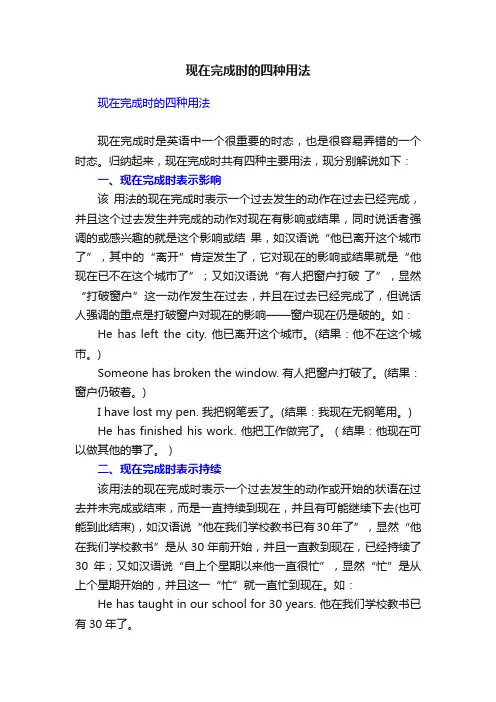
现在完成时的四种用法现在完成时的四种用法现在完成时是英语中一个很重要的时态,也是很容易弄错的一个时态。
归纳起来,现在完成时共有四种主要用法,现分别解说如下:一、现在完成时表示影响该用法的现在完成时表示一个过去发生的动作在过去已经完成,并且这个过去发生并完成的动作对现在有影响或结果,同时说话者强调的或感兴趣的就是这个影响或结果,如汉语说“他已离开这个城市了”,其中的“离开”肯定发生了,它对现在的影响或结果就是“他现在已不在这个城市了”;又如汉语说“有人把窗户打破了”,显然“打破窗户”这一动作发生在过去,并且在过去已经完成了,但说话人强调的重点是打破窗户对现在的影响——窗户现在仍是破的。
如:He has left the city. 他已离开这个城市。
(结果:他不在这个城市。
)Someone has broken the window. 有人把窗户打破了。
(结果:窗户仍破着。
)I have lost my pen. 我把钢笔丢了。
(结果:我现在无钢笔用。
)He has finished his work. 他把工作做完了。
(结果:他现在可以做其他的事了。
)二、现在完成时表示持续该用法的现在完成时表示一个过去发生的动作或开始的状语在过去并未完成或结束,而是一直持续到现在,并且有可能继续下去(也可能到此结束),如汉语说“他在我们学校教书已有30年了”,显然“他在我们学校教书”是从30年前开始,并且一直教到现在,已经持续了30年;又如汉语说“自上个星期以来他一直很忙”,显然“忙”是从上个星期开始的,并且这一“忙”就一直忙到现在。
如:He has taught in our school for 30 years. 他在我们学校教书已有30年了。
He has been busy since last week. 自上个星期以来他一直很忙。
He has worked for us ever since he left school. 他离开学校以后就一直为我们工作。
现在完成时的用法总结1.现在完成时的构成:- 一般动词:动词原形 + ed(例如:worked)- 以不发音的“e”结尾的动词:动词原形 + d(例如:lived)- 以辅音字母+y结尾的动词:变y为i,再加ed(例如:studied)2.现在完成时的用法:- 表示过去的经历或经验:I have visited China twice.(我去过中国两次。
)- 表示过去开始的动作一直延续到现在:She has lived in London for five years.(她在伦敦住了五年了。
)- 表示过去发生的动作对现在产生的影响:I have lost my keys.(我把钥匙弄丢了。
)- 表示过去完成的动作对现在产生的结果:They have finishedtheir homework, so they can go out to play.(他们做完作业了,所以可以出去玩。
)- 表示刚刚发生的动作:Have you seen the movie?(你看过这部电影吗?)3.现在完成时的时间状语:- 强调完成的时间段:for/during + 时间段(例如:for two hours, during the summer)- 强调完成的具体时间点:in + 具体时间(例如:in 2005, in the morning)- 强调从过去其中一时刻一直延续到现在:since + 过去时点(例如:since last week, since I was a child)4.现在完成时与一般过去时的区别:- 现在完成时:I have finished my work.(我已经完成了我的工作。
)- 一般过去时:I finished my work.(我完成了我的工作。
)5.现在完成时的否定句和疑问句:- 否定句:在助动词“have/has”后加not(haven't/hasn't),例如:I haven't seen him.(我没有见过他。
现在完成时的用法及例句一、现在完成时的基本用法现在完成时属于英语中最常用的时态之一,用于描述发生在过去某个时间点开始并延续至现在的动作或情况。
它由“have/has + 过去分词”构成,可用于肯定句、否定句和疑问句等语境中。
1. 肯定句肯定句结构为“主语 + have/has + 过去分词”。
例如:- I have finished my homework.(我已经完成了作业。
)- He has lived in London for five years.(他已经在伦敦住了五年。
)2. 否定句否定句要加上“not”,结构为“主语 + have/has + not + 过去分词”。
例如:- They have not seen each other since last year.(他们自从去年以来就没有见面。
)- She has not finished reading the book yet.(她还没有读完那本书。
)3. 疑问句疑问句则将助动词“have/has”提前至主语之前,并加上疑问词。
例如:- Have you ever been to Paris?(你曾经去过巴黎吗?)- Has she received the package yet?(她收到包裹了吗?)二、现在完成时代表延续性的动作或情况1. 表示从过去到现在的经历或经验现在完成时常用于描述一个人在过去某个时间开始并延续至今的经历或经验。
例如:- I have traveled to many countries.(我去过很多国家。
)- She has studied English since she was a child.(她从小就学习英语。
)2. 表示动作刚刚结束现在完成时也可用于表示刚刚发生、刚刚结束的动作,强调此动作对现在造成的影响。
例如:- I have just finished cooking dinner.(我刚煮完晚餐。
人教版英语现在完成时用法总结含解析一、选择题1.— Where is your son Jimmy living now?— He________the city of Yangzhou, China for two years.A.has come to B.has been to C.has gone to D.has been in 2.Gina can’t go to the farm with her classmates because she________ a bad cold.A.is caught B.is catching C.will catch D.has caught 3.—See? The strange man ________ around our house again. Should we call the police?—Oh, no. He is our new neighbor, who moved upstairs the day before yesterday.A.walks B.walked C.has walked D.is walking 4.—Will your cousin go to Guiyang for the summer holiday?—In fact, he ________ Guiyang since he graduated.A.has gone to B.has been to C.has been in D.went to 5.Sarah is only 15 years old, but she ________ the Tennis Club for three years.A.joined B.has joined C.has been in D.was6.Lisa ________ her homework yet. I am afraid she can't go to the park with you.A.didn't finish B.hasn't finished C.wasn't finishing D.won't finish 7.What a pity! My new computer__________ a virus and it can't work now.A.catches B.caught C.is caught D.has caught 8.— When will your sister go to England?— She _________ London since four months ago.A.went to B.has gone to C.has been to D.has been in 9.—Where is your uncle? I haven't seen him for a long time.—He Shanghai for about half a year. He moved there last October.A.has gone to B.has been to C.has arrived in D.has been in 10.— I think the man over there must be Douglas.— It ________ be him. He has ________ to Australia.A.can’t, gone B.can’t, been C.may not, been D.mustn’t, gone 11.— Would you like to see the film The Wondering Earth with me?—I’m sorry I __________it twice.A.see B.have seen C.am seeing D.saw 12.—What do you think of the latest 5G smart phone?— It's amazing. It is the most wonderful phone I ________.A.used B.will use C.was using D.have used 13.―Olivia, are you sure your aunt ________back from America?―Yes. My mom told me. I'm going to see her now.A.had come B.came C.is coming D.has come 14.The manager reached Nanjing last Wednesday. He________there for 10 days.A.has been B.has got C.has reached D.has arrived 15.It's reported that Xiangshui explosion(爆炸)__________78 persons and the doctors are trying their best to save the wounded.A.kills B.has killed C.killed D.had killed16.My mother is a teacher. She ________ English in our school since she graduated from university.A.taught B.has taught C.is teaching D.will teach 17.The number of city parks in Lishui ______ a lot since it became a district of Nanjing. A.increase B.will increase C.increased D.has increased 18.The boy in red ___________ the football club for 3 years. He can play football very well now. A.has joined B.has been in C.joined D.was in 19.—Oh, your spoken English is very good, Linda.—Thank you. I _____________in England for three years.A.have studied B.studied C.was studying D.study20.—Look! The man looks like Mr. Li.—It can’t be him. Because he with his families________Japan since last Thursday and they haven’t returned.A.has gone to B.has been to C.have been in D.has been in21.一How can you start playing games so soon, Tom?一 I ______ my homework, Mom.A.finished B.have finished C.will finish D.finish 22.—Have you been to the Robot Restaurant in our city?—No. Although it _________ for more than a year, I’m far too busy t o go there.A.has started B.has been on C.has been open D.has opened 23.Hurry up! The concert ______ for ten minutes.A.has begun B.has been on C.has gone D.has finished 24.Since Tencent released Wechat, it ________ one of the most popular apps in the world. A.became B.has become C.has been D.was25.—What changes________in your lives?—Our lives have changed a lot, like...A.have there had B.has there been C.have there been D.has there had 26.— Excuse me, which movie are you waiting for?—Cliff Walkers. We ________ here for more than two hours.A.wait B.are waiting C.waited D.have waited 27.—Carl, are you coming with us?—I’d love to, but something unexpected ______.A.is coming up B.comes up C.came up D.has come up 28.—Where are the doctors now?—In the meeting room. They ________ the meeting for 10 minutes.A.have begun B.have been on C.have had D.have been held29.So far, China ________ the world’s largest highway network, with a total length of 160,000 kilometers.A.builds B.built C.will build D.has built 30.—Would you like to watch the film Fast and Furious 9 tonight?— Sure. I still want to see it again although I ________ it already.A.watch B.will watch C.was watching D.have watched 31.—How long ________ you ________ chemistry so far?—For almost one year.A.are; studying B.do; study C.have; studied D.will; study 32.Mr. Wu ________ Germany since three years ago, so he knows a lot about the German culture and customs.A.has gone to B.went to C.has been to D.has been in 33.— Where is Jim?— He ________ B eijing on business for a week. He’ll be back tomorrow.A.has come to B.has gone to C.has been to D.has been in 34.— Where is the head teacher?— She ________ to the library to search for some information.A.goes B.will go C.has been D.has gone 35.—Where is your uncle? —In the USA.He ________ there for two months.A.has gone B.has gone to C.has been D.has been to 36.—Hello, Jack. This is Sandy. What are you doing?—I’m watching an exciting basketball match. It _______ for half an hour.A.begins B.began C.has begun D.has been on 37.— I remember that Mr.Green once traveled broad.— Not only Mr.Green but also his daughters ______ abroad twice.A.have gone B.have been C.has gone D.has been 38.Please turn up the music, don’t worry about the baby because he ________ for half an hour. A.woke up B.has woke up C.was awake D.has been awake 39.The Hong Kong-Zhuhai-Macao Bridge, as the world’s longest cross-sea bridge, ________ for over one and a half years.A.has opened B.has been open C.has been opened D.opened 40.—Wher e’s your mum, Lucy?—She together with her sisters ________ the supermarket since two hours ago.A.has gone to B.has been to C.has been in D.have gone to 41.—Have you been to SuNing Plaza in our city?—No. Although it ________ for more than a week, I am far too busy to go there.A.has started B.has opened C.has been open D.has been on 42.The movie Hi, Mom________ the hearts of many people since it was shown in February. A.wins B.won C.will win D.has won43.Not all the students in my class would like to go to Suzhou Museum next week because about three-fifths of them _________ there before.A.have been B.have gone C.has been D.have been to44.—Why are you in a hurry?—I am late. Can you tell me how long _______?A.has the film been on B.the film has started C.the film has lasted D.has the film ended 45.My dog _______ for three days and I’m now very worried now and I want to find it as soon as possible.A.has been gone B.has gone C.is gone D.was gone 46.—Sorry, I’m late. There’s too much traffic on the roa d.—It doesn’t matter. The film has just_______for five minutes.A.begun B.finished C.been on D.been over 47.—Jim, turn down the music. Our baby is sleeping.—Don’t worry. He__________ for half an hour.A.woke up B.has woken up C.was awake D.has been awake 48.—Mum, I want to watch the news about our school. Change the channel, please!—What a pity! It is eight o'clock now. It___________ for a while.A.has been over B.was over C.has finished D.finished 49.—Have you ever worked on this farm?—Yes. I _________ cows as a farmer there for two years.A.raised B.was raising C.have raised D.will raise 50.Neither Mark nor his parents ________ Sanya before, so they can’t wait to start the journey. A.have gone to B.have been to C.has gone to D.has been to【参考答案】***试卷处理标记,请不要删除一、选择题1.D【详解】句意:——你的儿子Jimmy现在住在哪里?——他在中国扬州已经两年了。
人教版英语英语现在完成时的用法大全及解析一、初中英语现在完成时1.—Where is your mother?—She ______ Australia and she ______ Sydney for two weeks.A. has been to; has been inB. has been to; has been toC. has gone to; has been inD. has gone to; has been to【答案】C【解析】【分析】句意:——你的妈妈在哪里?——她去了澳大利亚,她在悉尼呆了两周了。
has been to”去过某地“,现在已经回来了;has gone to”去了某地“,还没有回来;has been in”待在某地“一段时间。
根据句意Where is your mother?可知,她的妈妈还没有回来,第二个空后面有一段时间for two weeks,应该用be in,故应选C。
【点评】考查动词的时态,以及has been to ,has gone to ,has been in的含义和用法。
2.—Do you still play basketball?—Oh, no. I ____ it for the past two years.A. haven't playedB. didn't playC. won't playD. hadn't played【答案】A【解析】【分析】句意:——你还打篮球吗?——哦,不了。
我已经有两年没有打过了。
根据句中的for the last two years可知应与完成时态连用,又有时间是the last two years可知是从现在往前两年,因此应使用现在完成时态,故选A。
【点评】考查动词时态中的for+段时间与完成时态连用,根据时间确定是现在完成还是过去完成。
3.It has been three years since I ______ a teacher.A. becomeB. becameC. becomingD. to become【答案】 B【解析】【分析】题意:现在完成时里,since从句里动词应用一般过去时。
人教版英语英语现在完成时用法总结含答案一、初中英语现在完成时1.— Where is your uncle? I haven't seen him for a long time.— He _______ Beijing for about half a year. He moved there in January.A. has gone toB. has been toC. has arrived inD. has been in【答案】 D【解析】【分析】考查延续与非延续性动词。
根据for about half a year是一段时间,排除非延续性动词A、B、C这三个选项,故选D。
2.Mike used to be a top student, but he behind since he lost himself in computer games.A. fellB. has fallenC. wasD. has been【答案】 D【解析】【分析】句意为“Mike过去是尖子生,但自从迷上电子游戏以来成绩落后了”。
由since可知but后的主句用现在完成时,瞬间动词fall不能和since引导的时间状语从句连用,故用延续性动词be。
故选D。
【点评】本题考查现在完成时中非延续性动词和延续性动词的转换。
3.Great changes in my hometown in the last few years.A. took placeB. will take placeC. have taken placeD. have been taken place 【答案】C【解析】【分析】句意:过去几年我的家乡发生了巨大的变化。
in the last few years意为“在过去的几年里”,用于现在完成时;take place“发生”没有被动语态。
故答案选C。
【点评】考查现在完成时。
4.The Greens many places of interest since two years ago.A. has visitedB. have visitedC. visitedD. will visit【答案】 B【解析】【分析】句意:自两年前开始,格林一家参观了许多名胜。
人教版英语英语现在完成时完整归纳含答案解析推荐精选一、初中英语现在完成时1.—I haven't seen your grandfather for two years. What happened to him?—Oh, he ________ here for two years.A. stayedB. hasn't stayedC. staysD. hadn't stayed【答案】 B【解析】【分析】答语中的for two years是一段时间,用在现在完成时的句中时。
现在完成时的结构:主语+have/ has +过去分词。
可知选B。
【点评】考查现在完成时2.I ________ an invitation to the concert. I can't wait to go.A. receiveB. will receiveC. was receivingD. have received【答案】D【解析】【分析】句意:我已经收到音乐会的邀请,我等不及要去了。
由句意得知我已经收到去音乐会的邀请函,动作已完成造成的影响是我等不及要去,要用现在完成时,故答案选D。
【点评】考查动词时态。
根据题目所给语境推断出应使用的时态。
3.Great changes in my hometown in the last few years.A. took placeB. will take placeC. have taken placeD. have been taken place 【答案】C【解析】【分析】句意:过去几年我的家乡发生了巨大的变化。
in the last few years意为“在过去的几年里”,用于现在完成时;take place“发生”没有被动语态。
故答案选C。
【点评】考查现在完成时。
4.The tall building here for 100 years.A. isB. wasC. has beenD. is been【答案】 C【解析】【分析】那幢高楼在这里已经有100年了。
人教版英语英语现在完成时的用法大全含解析一、初中英语现在完成时1.—They say there is a new restaurant near here.—Yes, and it ______ for more than a week.A. has been openB. openC. is openingD. opens【答案】 A【解析】【分析】句意:——他们说在这附近有一个新的餐馆。
——是的,它已经开了一个多星期了。
根据 for more than a week ,可知用现在完成时,have/has been done,故选A。
【点评】考查现在完成时,注意识记其标志词。
2.Mike used to be a top student, but he behind since he lost himself in computer games.A. fellB. has fallenC. wasD. has been【答案】 D【解析】【分析】句意为“Mike过去是尖子生,但自从迷上电子游戏以来成绩落后了”。
由since可知but后的主句用现在完成时,瞬间动词fall不能和since引导的时间状语从句连用,故用延续性动词be。
故选D。
【点评】本题考查现在完成时中非延续性动词和延续性动词的转换。
3.—Hi, Tom! you ever the Bird's Nest?—Yes, I have. It's fantastic.A. Have, been toB. Have, gone toC. Did, go to【答案】 A【解析】【分析】句意:——你好,Tom!你曾经去过鸟巢吗?——是的,我去过。
它是极好的。
根据答语—Yes, I have.可知是以have开头的现在完成时的一般疑问句,排除C。
have been to+地点名词,去过某地,去了并且回来了;have gone to+地点名词,去了某地,去了还没有回来,在去或者回来的路上。
根据It's fantastic.可知去了并且回来了,故选A。
【点评】考查短语辨析,注意平时识记其区别,理解句意。
4.——Where is Mr. Wang?——He together with his students ________ Zhuyuwan Park.A. has gone toB. have gone toC. has been toD. have been to【答案】 A【解析】【分析】句意:—王老师在哪里?—他同他的学生去了Zhuyuwan公园。
A. has gone to去了,没在这里。
主语是单数;B. have gone to去了,没在这里。
主语是复数;C. has been to去过,没在那里;主语是单数;D. have been to去过,没在那里;主语是复数。
本句He是主语,together with his students是介词短语,做定语不是主语,所以用has。
王老师去公园了不在这里,所以用has gone to。
故选A。
【点评】考查主谓一致和短语的用法。
5.—_______ my dictionary? I can't find it anywhere.—I _______ it on the desk when I came in.A. Did you see; have seenB. Have you seen; have seenC. Have you seen; sawD. Did you see; see【答案】C【解析】【分析】句意:---你看见我的词典了吗?我到处都找不到了。
---我进来的时候看见在桌子上。
根据句意,第一空实际上是询问词典在哪儿,即表示看见词典与现在有关系,所以用现在完成时;第二空根据when I came in可知是过去我进来的时候发生的动作,用一般过去时,故答案为C。
【点评】考查动词的时态,注意理解句意,根据时态的定义判断。
6.—I'm sorry for being late.—Never mind. The meeting ______for only 5 minutes. This way, please.A. has begunB. has endedC. has been on【答案】 C【解析】【分析】句意:——对不起,我迟到了。
——没关系.会议只开了5分钟,请这边走。
for+段时间,通常用于现在完成时态,结构是have/has+动词的过去分词,begin和end都是短暂性动词,不能用于现在完成时态中表示动作或状态的延续,因此A,B不正确.has been on"在进行,开着(的状态)",故选C【点评】现在完成时表示延续性的状态。
7.—How many times _______ you _______ to Beijing this year?—Three times.A. have;beenB. had;beenC. have;goneD. had;gone【答案】 A【解析】【分析】句意是:——你今年去过北京几次?——三次。
考查have been 与have gone 的区别。
have been 是指去过某地切已经回来了,have gone 是指去了某地还没有回来,根据答句Three times.可以推测已经回来了,故选 A。
8.—— ______you _____ out the problem, Sam?——Not yet, but I'm going to.A. Did, workB. Are, workingC. Have, workedD. Will , work【答案】 C【解析】【分析】句意:萨姆,你计算出这道数学题了吗?——还没有,但是快了。
结合语境可知上文描述的是现在已经完成的动作,故用现在完成时态。
选C。
【点评】英语中的时态主要是借助于时间状语与上下文语境来进行判断。
解答此类题型,首先要注意句子中的时间状语,如果没有则要通过分析上下文,结合语境来判断句子的时态。
英语疑问句中一般具有时态上的对应关系,注意结合这一特点进行区分。
9.His cat has ________ for five weeks.A. diedB. been deadC. dyingD. dies【答案】 B【解析】【分析】句意:他的猫已经死了5个星期了。
die是短暂性动词,不能表示状态的延续。
由时间状语 for five weeks可知应用延续性动词,故答案选B。
【点评】考查现在完成时。
10.He ___________ for ten years.A. has been marriedB. marriedC. got marriedD. has married【答案】A【解析】【分析】在现在完成时态里,当出现for+段时间时,短暂性动词必须换成延续性动词。
get married需换成be married。
故选A。
【点评】该题考查的是对现完时态中的短暂性动词与延续性动词动词的掌握,这一块内容是中考的重难点,考试频率占时态考查题的一半以上。
学生必须牢记这两种词的转换及转换条件。
11.A number of tourists _____ Yangzhou many times because such a beautiful city.A. have been toB. has been toC. has gone toD. have gone to【答案】 A【解析】【分析】句意:很多游客多次去过扬州,因为它是如此美丽的一个城市。
have been to,表示去过某个地方,have gone to,表示去了某地,还没回来。
many times是很多次,游客们应该是去过很多次,用have/has been to+地点,由于主语是复数,助动词用have,故选A。
【点评】考查现在完成时,注意have been to表示去过回来了,have gone to表示去了还没回来。
12.— Where is your uncle? I haven't seen him for a long time.— He _______ Beijing for about half a year. He moved there in January.A. has gone toB. has been toC. has arrived inD. has been in【答案】 D【解析】【分析】考查延续与非延续性动词。
根据for about half a year是一段时间,排除非延续性动词A、B、C这三个选项,故选D。
13.—Where is your father?— .A. He has been to ShanghaiB. He has been in ShanghaiC. He has gone to ShanghaiD. He have been to Shanghai【答案】C【解析】【分析】句意:-你的父亲在哪儿?-他去上海了。
Have been to去过某地(已回);have been in在……;have gone to去了某地(未回)。
本题中父亲是人们在找的人,所以是去了某地,还没回来,用have gone to。
主语he是三人称单数,用has gone to。
故选C。
【点评】本题考查现在完成时。
以及Have been to;have been in;have gone to三个短语的词义和用法。
14.—Lucy, is your uncle a teacher?—Yes, he is. He history for nearly 20 years.A. teachesB. has taughtC. is teachingD. will teach【答案】B【解析】【分析】句意:——露西,你叔叔是老师吗?——是的,他是。
他教历史将近20年了。
根据句中的时间状语 for nearly 20 years ,可知,表示持续一段时间的动作,用现在完成时,have/has+过去分词。
主语是he,用has,故选B.【点评】考查现在完成时,注意其常与for+一段时间连用。
15.—The drama series The Thunder (破冰行动) hits screens these days.—Oh. What a pity! I ____________ any of them yet,A. doesn't watchB. didn't watchC. won't watchD. haven't watched【答案】 D【解析】【分析】句意:——连续剧《破冰行动》这些天正在霸屏。